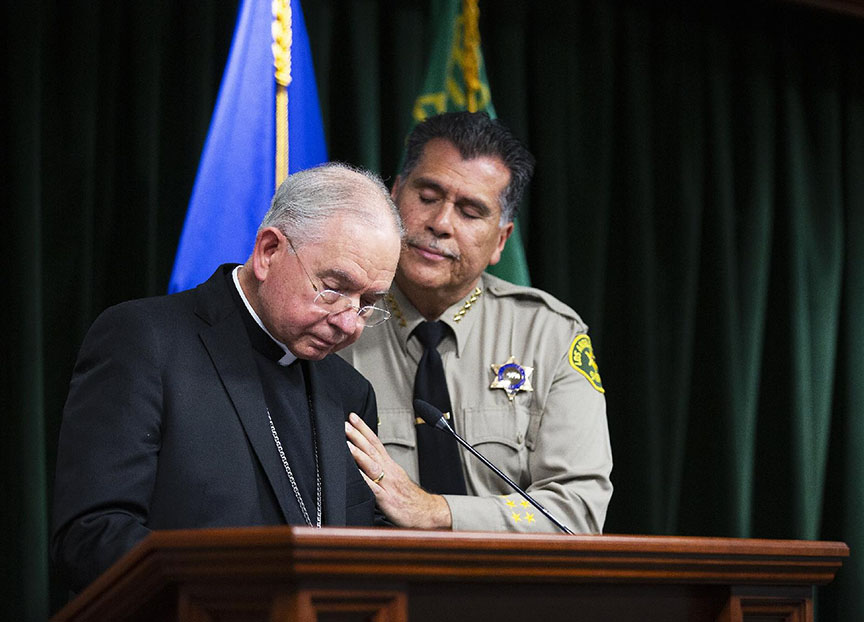
LOS ANGELES. The suspect in the shooting death of Los Angeles Auxiliary Bishop David G. O’Connell was formally charged with murder Feb. 22 after admitting to killing him.
Bishop O’Connell was found dead of at least one gunshot wound to his upper torso in his home in the Los Angeles suburb of Hacienda Heights on the afternoon of Feb. 18.
Carlos Medina, 61, faces one felony count of murder and a special allegation that he used a firearm, according to the LA County District Attorney’s Office. His formal arraignment is scheduled for March 22 at the Foltz Criminal Justice Center in downtown Los Angeles.
Medina is the husband of Bishop O’Connell’s housekeeper and had done handyman work at the home, authorities said. He was arrested at his Torrance home Feb. 20, after a six-hour standoff with SWAT and Los Angeles County Sheriff’s deputies.
District Attorney George Gascón said at a press conference Feb. 22 that Medina admitted to the killing. If convicted, Medina faces up to 35 years to life in prison.
“This was a brutal act of violence against a person who dedicated his life to making our neighborhoods safer, healthier and always serving with love and compassion,” Gascón said.
“As Catholics around Los Angeles and the nation start the holy season of Lent, let us reflect on Bishop O’Connell’s life of service and dedication to those in greatest need of our care,” Gascón added. “Charging Mr. Medina will never repair the tremendous harm that was caused by this callous act, but it does take us one step closer to accountability.”
At an afternoon news conference Feb. 20, Los Angeles County Sheriff Robert G. Luna announced that citizen tips led to the 8:15 a.m. arrest that day of Medina after an all-night search.
In an emotional press conference, Luna said “my heart grieves” for the death of Bishop O’Connell, based on all the calls of support he received in the investigation over a period of 48 hours.
“This man, this bishop, made a huge difference in our community,” said Luna. “He was loved. It is very sad that we are gathered here today about this murder.”
Archbishop José H. Gomez of Los Angeles, one of the speakers at the press conference, stopped several times during his remarks to collect himself. At one point, Luna put his arm around Archbishop Gomez’s shoulder to comfort him.
“On behalf of our entire community, I want to share thanks for your professionalism and sensitivity,” Archbishop Gomez said of the investigation. “It is a sad and painful moment for all of us. Let us keep praying for Bishop Dave and his family, just as he prayed for law enforcement officials.”
Bishop O’Connell was originally from Brooklodge, Glanmire, in County Cork, the largest county in Ireland. He studied for the priesthood at the former All Hallows College in Dublin and was ordained to serve in the Archdiocese of Los Angeles in 1979.
Bishop O’Connell was named an auxiliary bishop of Los Angeles by Pope Francis in July 2015. Since then, he had served as episcopal vicar for the San Gabriel Pastoral Region, one of the Los Angeles Archdiocese’s five regions.
During his time as auxiliary bishop in Los Angeles, evangelization, pastoral care for immigrants, and ensuring the future of his region’s Catholic schools were all top priorities for Bishop O’Connell, who believed that “parishes and schools are powerful instruments of transformation of people’s lives and of neighborhoods.”
Before being named a bishop, he was well-known for his pastoral work in south Los Angeles – where he served as pastor of four different parishes – in the years before and after the 1992 Rodney King riots. He played a key role, along with other local faith leaders, in bringing together communities already suffering from gang violence, poverty, and drugs, while working to restore trust between community members and law enforcement.
This report was compiled by the staff of Angelus, the news outlet of the Archdiocese of Los Angeles.









